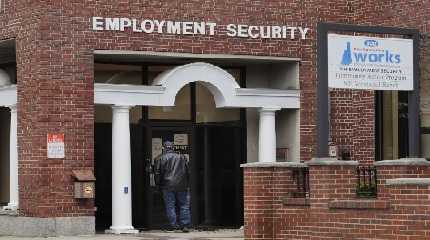
WASHINGTON, May 7 (Xinhua) -- U.S. employers added 428,000 jobs in April amid tight labor market, with the unemployment rate unchanged at 3.6 percent, the U.S. Labor Department reported on Friday.
Job growth was widespread, led by gains in leisure and hospitality, in manufacturing, and in transportation and warehousing, according to the report released by the department's Bureau of Labor Statistics (BLS).
The growth in total nonfarm payroll employment for February was revised down by 36,000 to 714,000, and the gain for March was revised down by 3,000 to 428,000, the report showed.
Companies were struggling to hire as labor market supply could not meet demand. The number of job openings was little changed at 11.5 million by end of March, the highest level in the history of the series which began in December 2000, the BLS reported Tuesday.
The newly released monthly employment report showed that the number of unemployed persons, however, dropped slightly from 6 million in March to 5.9 million in April, indicating that there were 1.9 job positions for every unemployed.
"The labor market is extremely tight, and inflation is much too high," Federal Reserve Chair Jerome Powell said Wednesday afternoon at a press conference, noting that the central bank is moving "expeditiously" to bring inflation back down.
Acknowledging that there is an imbalance between supply and demand in the labor market, Powell said the Fed's policies would moderate demand, which would help lower job vacancies. With more people coming back to the labor market, supply and demand will come back into balance, he said.
The April employment report showed that the labor force participation rate dropped slightly to 62.2 percent, still about one percentage point below the pre-pandemic level of 63.4 percent.
"The labor force participation rate disappointingly fell two-tenths of a percentage point, but the decline came on the heels of a string of solid increases, and we are cautious about reading too much into today's drop," Sarah House and Michael Pugliese, economists at the Wells Fargo Securities, said in an analysis.
House and Pugliese also noted that wage growth looks to be showing some "tentative signs of peaking" on a year-ago basis but is still running more than double its average pace in the 2010s.
Average hourly earnings for all employees on private nonfarm payrolls rose by 10 cents, or 0.3 percent, to 31.85 U.S. dollars in April, the BLS report showed. Over the past 12 months, average hourly earnings have increased by 5.5 percent.
"Surging labor costs are adding to inflation pressures and eroding living standards; rising wages do not mean much when they are trailing inflation," Diane Swonk, chief economist at the major accounting firm Grant Thornton, said in a blog.
U.S. personal consumption expenditures (PCE) price index, the Federal Reserve's preferred inflation measure, continued to surge by 6.6 percent in March over the past year, well above the Fed's 2-percent inflation goal, the Commerce Department reported last week.
Noting that the labor market remained strong in April, Swonk said that is a blessing and a curse.
"It means more opportunities for workers but the tides have turned and the resilience of the labor market is now adding to inflationary pressures," Swonk said.
The BLS report also showed that the unemployment rate was unchanged at 3.6 percent in April, which was slightly above the pre-pandemic level of 3.5 percent.
The Fed on Wednesday raised its benchmark interest rate by half a percentage point, marking the sharpest rate hike since 2000, and signaled it would keep hiking at that pace at the next couple of meetings.
As the Fed takes more aggressive steps to rein in the highest inflation in four decades, Swonk said Powell was hopeful that he could derail inflation without a "significant" increase in unemployment. "Hope is not the same as reality," Swonk said.
"Calibrating monetary policy in a way that cools the labor market enough to bring down inflation but not so much that it tips the economy into recession will be a difficult task," said House and Pugliese.




